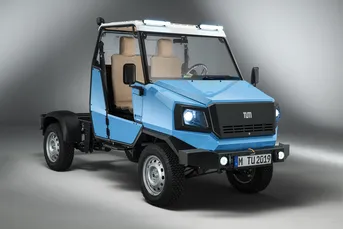aCar Mobility - Electric Mobility in Rural Africa
Contact: Clemens Pizzinini, M.Sc., Philipp Rosner, M.Sc., David Ziegler, M.Sc.
This project researches sustainable solutions for mobility problems concerning people, goods and equipment in rural areas of subsaharan africa over the coming decade. Parallel to the development and testing of a purpose-built vehicle, value generation opportunities in its local production, usage and maintenance are also being looked at. All that happens in close collaboration with the local population and universities.
Motivation
Economically, africa is growing very quickly and offers excellent food production potential. Nevertheless, more than 20% of subsaharan africa's population, especially small farmers in rural areas, face severe hunger. Reasons for that are widespread poverty, exacerbated by structural problems, lack of knowledge about improved farming methods and limited access to agricultural machinery. Within its special initiative "ONE WORLD - no hunger", the german Federal Ministry for Economic Cooperation and Development (BMZ) created green innovation centres for the agriculture and food sector in 14 countries supported by german development cooperation. Their goals are: improving resiliency in local food production, increasing income for small scale farming families and creating jobs in those communities, all through agricultural innovations. One part of this concept is a better connection between producers, their workforce and markets as well as decentralization of food processing in order to move value generation to those who need it most. This is where an attractive energy and mobility concept, respecting special needs and availabilities, can make a difference.
History
In an initial research project, also called aCar Mobility and running from 2014 to 2017, a vehicle concept was developed based on mobility data and user interviews. Two protoypes (P1 and P2) were constructed in this phase, the latter was displayed publicly at Frankfurt's International Automotive Exhibition (IAA) in 2017. Additionally, strategies for local production of battery elecric vehicles are being researched at our institute since 2017. In parallel, colleagues founded EVUM Motors GmbH to continue development of the vehicle to a competitive level and initially produce it in Germany. Expansion into african markets with local production sites is planned for the near future.
Vehicle
The aCar is a battery electric small utility vehicle conceived at our institute. It is specifically tailored to the needs and requirements of the rural population in subsaharan africa. It offers a simplified construction in order to facilitate local production. All wheel drive and a safe-to-touch 48 Volt power system make it usable and maintainable in difficult conditions.
Within the research project a refined, commercial version of the vehicle will be deployed in the target area (Ethiopia and Côte d'Ivoire) to generate first hand experience and data.
Current Research
From 2020 on, a renewed project investigates the questions of locally variable mobility needs, special technical requirements for battery electric vehicles and mobility-based business models in subsaharan africa scientifically. The following three research groups at the Institute of Automotive Technology are involved:
- Electric Powertrains (Philipp Rosner, B.Sc.)
- Vehicle Concepts (Matthias Brönner, M.Sc., Clemens Pizzinini, M.Sc.)
- Smart Mobility (David Ziegler, M.Sc.)
The gathered knowledge will be made publicly available to educational institutions worldwide.




